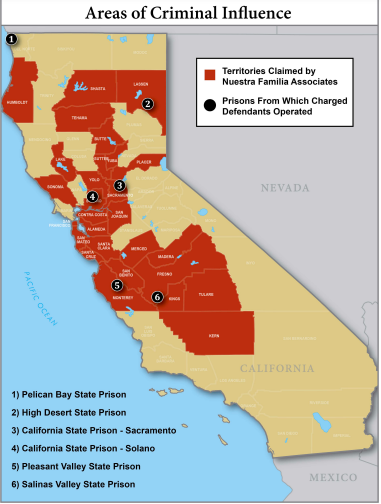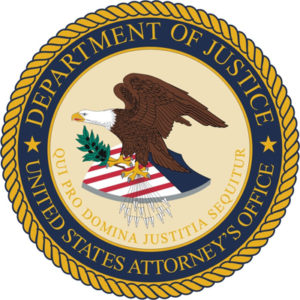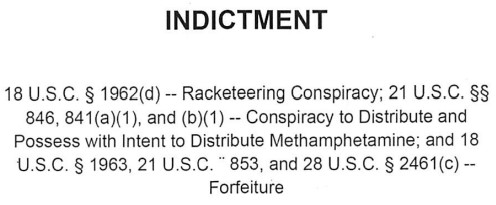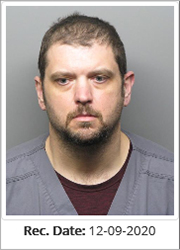Acting U.S. Attorney announces major law enforcement initiative to combat violence, drug distribution by La Nuestra Familia gang
Friday, September 17th, 2021
Map of La Nuestra Familia’s Areas of Criminal Influence. Source: FBI San Francisco
“Operation Quiet Storm was one of the largest gang takedowns in FBI San Francisco division’s history,” charges 55 defendants, some from Antioch
Acting U.S. Attorney Hinds emphasizes focus on community engagement to root out drivers of violent crime
 SAN FRANCISCO – Acting United States Attorney Stephanie M. Hinds held a press conference Thursday to announce the unsealing of federal charges filed against 55 defendants, many of whom were members of, or affiliated with, the Nuestra Familia prison gang and its subservient street gangs. Acting U.S. Attorney Hinds was joined in making the announcement by Federal Bureau of Investigation Special Agent in Charge Craig D. Fair, Drug Enforcement Administration Special Agent in Charge Wade R. Shannon, California Department of Corrections and Rehabilitation Chief Office of Correctional Safety Derrick Marion, Santa Clara Sheriff Laurie Smith, and San Jose Deputy Chief of Police Elle Washburn.
SAN FRANCISCO – Acting United States Attorney Stephanie M. Hinds held a press conference Thursday to announce the unsealing of federal charges filed against 55 defendants, many of whom were members of, or affiliated with, the Nuestra Familia prison gang and its subservient street gangs. Acting U.S. Attorney Hinds was joined in making the announcement by Federal Bureau of Investigation Special Agent in Charge Craig D. Fair, Drug Enforcement Administration Special Agent in Charge Wade R. Shannon, California Department of Corrections and Rehabilitation Chief Office of Correctional Safety Derrick Marion, Santa Clara Sheriff Laurie Smith, and San Jose Deputy Chief of Police Elle Washburn.
The focus of the press conference was the unsealing of 17 charging documents, including 14 indictments and 7 criminal complaints, setting out a broad array of charges against the defendants.
According to an FBI San Francisco tweet on Thursday, “Operation Quiet Storm was the culmination of more than 5 years of complex investigative work. The gangs targeted in this case are responsible for much of the illicit drug distribution and violent crime that has plagued areas throughout CA.”
“No single defendant is responsible for all the conduct I am describing,” said Hinds. “The charges against each defendant are described in a charging document that is unique to each defendant. By disrupting gang leadership, we reduce violence on our streets. By removing violent actors and crime drivers from the streets, we make our neighborhoods safer.”
According to the documents unsealed today, La Nuestra Familia – Spanish for “Our Family”– was a prison gang operating in the California state prison system. Falling under the gang’s supervision are Norteño street gangs established in numerous cities and counties, and in jails and prisons, throughout Northern California and elsewhere. Several of the charging documents unsealed Thursday describe various aspects of the gang. For example, one indictment (here (Leadership)) describes the largely-incarcerated leadership, while another (here (SJG)) describes the activities of a street gang called the San Jose Grande and yet another (here (EHP)) describes a group referred to as El Hoyo Palmas Street Gang. The picture that emerges is one of a violent and structured organization that finances its activities through crime and encourages its members to visit violence upon anyone who threatens the gang’s existence, including members who break gang rules, members who attempt to leave the gang, and rival gang members.
According to the documents unsealed Thursday, of the 55 defendants, 28 individuals were charged with racketeering crimes, while the remaining individuals were charged with drug trafficking and firearms offenses. Conspiracies alleged in the indictments include agreements to distribute drugs including heroine, methamphetamine, and cocaine; to commit armed robberies; and to commit murder. Additional defendants were charged with other related crimes ranging from drug distribution to armed robbery.
According to a San Diego Union-Tribune report, “Prosecutors said 36 of the defendants were already in state prison and have been moved to federal holding facilities. Authorities have not said how many of the 19 remaining defendants were arrested in law-enforcement sweeps this week.”
Acting U.S. Attorney Hinds emphasized the goal to “fish with a spear, not a net.”
“Working with our federal and state, local, and tribal law enforcement partners, as well as impacted communities, our law enforcement efforts have focused on addressing violent crime-driven by gangs,” said Hinds. “We will continue to work with our law enforcement partners, as well as members of our community, to identify and address the drivers of crime in our neighborhoods. We intend to continue to deliver results by focusing on the needs of our communities.”
“Operation Quiet Storm was one of the largest gang takedowns in FBI San Francisco division’s history,” said FBI San Francisco Special Agent in Charge Fair. “The coordinated efforts of this operation were done with one goal in mind: to disrupt the communications and organizational structure of a criminal network who has terrorized our neighborhoods for far too long.”
“Today’s operation strikes a substantial blow to Nuestra Familia leadership. This investigation revealed the wide-ranging influence of the gang that extends far beyond prison walls. It is clear they have hard and fast rules, and those who run afoul are met with intimidation and violence that spills into our communities,” said DEA Special Agent in Charge Shannon. “We will continue to look at these organizations structurally to disrupt and dismantle them.”
An indictment merely alleges that crimes have been committed, and the defendants are presumed innocent until proven guilty beyond a reasonable doubt.
This case is being prosecuted by the Organized Crime Strike Force of the United States Attorney’s Office for the Northern District of California. The prosecution is the result of an investigation by the FBI (San Francisco, Sacramento, and Phoenix Divisions) and the DEA, with the assistance of the Santa Clara County Sheriff’s Office, the California Department of Corrections and Rehabilitation, the U.S. Bureau of Alcohol, Tobacco, Firearms, and Explosives, the Santa Clara County District Attorney’s Office, and the San Jose Police Department, as well as the support of the Alameda County Sheriff’s Office, Antioch Police Department, Campbell Police Department, Fremont Police Department, King’s County Sheriff’s Office, Monterey County Sheriff’s Office, Mountain View Police Department, Sacramento Police Department, Salinas Police Department, Menlo Park Police Department, Santa Clara County Parole Department, Santa Clara County Probation Department, Santa Clara Police Department, Santa Cruz County District Attorney’s Office, Santa Cruz County Sheriff’s Office, Modesto Police Department, San Francisco Police Department, and Stanislaus County Sheriff’s Department, and Sunnyvale Department of Public Safety.
This investigation and prosecution are part of the Organized Crime Drug Enforcement Task Force (“OCDETF”), which identifies, disrupts, and dismantles the highest-level drug traffickers, money launderers, gangs, and transnational criminal organizations that threaten the United States by using a prosecutor-led, intelligence-driven, multi-agency approach that leverages the strengths of federal, state, and local law enforcement agencies against criminal networks.










 While critics of Contra Costa County Sheriff David Livingston and his department again blasted the Contra Costa County Board of Supervisors with complaints over the $2.8 million in proposed increased funding for the 2020-2021 fiscal year at their meeting Tuesday, no one paid any attention to an important Grand Jury report on “Police Department Staffing” that supervisors unanimously approved as a consent item during the same meeting.
While critics of Contra Costa County Sheriff David Livingston and his department again blasted the Contra Costa County Board of Supervisors with complaints over the $2.8 million in proposed increased funding for the 2020-2021 fiscal year at their meeting Tuesday, no one paid any attention to an important Grand Jury report on “Police Department Staffing” that supervisors unanimously approved as a consent item during the same meeting.











